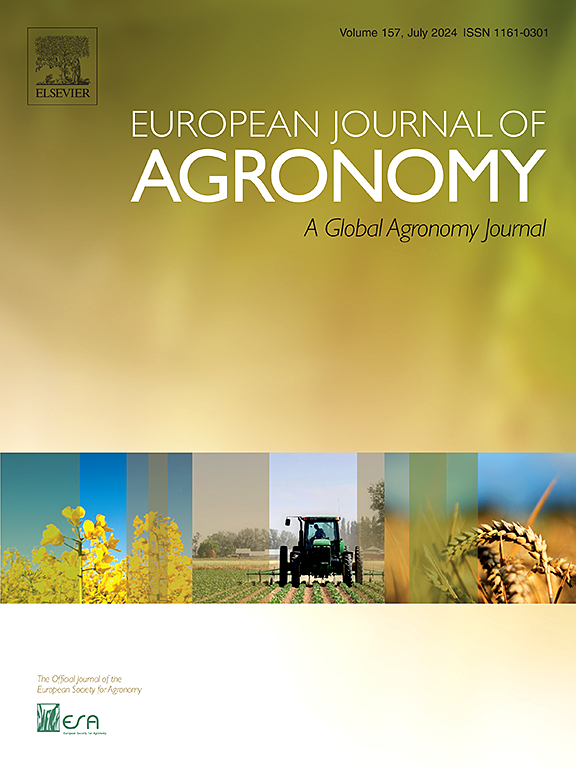生物炭在气候智能型农业中的可持续性综述:最新进展、新趋势和未来方向
IF 4.5
1区 农林科学
Q1 AGRONOMY
引用次数: 0
摘要
气候变化和土壤退化威胁着全球农业,需要可持续的解决方案。本研究采用了双方法学方法,将系统综述与定量文献计量学分析相结合,以评估生物炭在气候智能型农业中的潜力。从Scopus数据库中检索了2010年至2023年间发表的180篇文献。利用Bibliometrix R软件包,本研究进行了趋势分析、国家层面的出版指标、关键词共现分析、专题制图和专题演变。与此同时,一项由PRISMA协议指导的系统审查综合了80篇同行评议文章的发现。文献计量学分析显示,中国贡献了18% %的出版物,其次是印度(13% %)和巴基斯坦(6% %)。专题测绘将生物炭确定为与气候智能型农业密切相关的“动力主题”(研究领域中一个发达的中心主题)。该研究揭示了生物炭的多重好处:提高土壤肥力,提高作物产量(马铃薯产量高达340 %),并封存碳,有可能减少2.56 × 109吨二氧化碳当量/年,约占2023年全球年度温室气体排放量的4.7 %。然而,经济可行性和长期后果,如几十年来土壤微生物群和养分循环动态的潜在变化,继续构成挑战。该研究强调了生物炭在应对气候变化和促进可持续农业方面的前景,同时强调需要长期的实地研究、机械研究和跨学科方法才能成功实施。碳信用额度、补贴生物炭生产技术和综合农业推广计划等政策激励措施可以加速小农系统对生物炭的采用。本文章由计算机程序翻译,如有差异,请以英文原文为准。
A review of biochar's sustainability in climate-smart agriculture: Recent advances, emerging trends, and future directions
Climate change and soil degradation threaten global agriculture, necessitating sustainable solutions. This study adopted a dual methodological approach, integrating a systematic review with quantitative bibliometric analysis to evaluate the potential of biochar in climate-smart agriculture. A total of 180 documents published between 2010 and 2023 were retrieved from the Scopus database. Using the Bibliometrix R package, the study conducted trend analysis, country-level publication metrics, keyword co-occurrence analysis, thematic mapping, and thematic evolution. In parallel, a systematic review guided by PRISMA protocols synthesized findings from 80 peer-reviewed articles. The bibliometric analysis showed that China contributed 18 % of publications, followed by India (13 %) and Pakistan (6 %). Thematic mapping identified biochar as a "motor theme" (a well-developed and central topic within the research field) closely associated with climate-smart agriculture. The study revealed biochar's multiple benefits: enhancing soil fertility, increasing crop yields (up to 340 % for potatoes), and sequestering carbon with a potential to mitigate 2.56 × 109 tons of CO2-eq/year, representing about 4.7 % of global annual greenhouse gas emissions in 2023. However, economic feasibility and long-term consequences, such as potential shifts in soil microbiota and nutrient cycling dynamics over decades, continue to pose challenges. The study highlights biochar's promise in addressing climate change and promoting sustainable agriculture while stressing the need for long-term field studies, mechanistic research, and transdisciplinary approaches for successful implementation. Policy incentives such as carbon credits, subsidized biochar production technology, and integrated agricultural extension programs could accelerate biochar adoption in smallholder systems.
求助全文
通过发布文献求助,成功后即可免费获取论文全文。
去求助
来源期刊

European Journal of Agronomy
农林科学-农艺学
CiteScore
8.30
自引率
7.70%
发文量
187
审稿时长
4.5 months
期刊介绍:
The European Journal of Agronomy, the official journal of the European Society for Agronomy, publishes original research papers reporting experimental and theoretical contributions to field-based agronomy and crop science. The journal will consider research at the field level for agricultural, horticultural and tree crops, that uses comprehensive and explanatory approaches. The EJA covers the following topics:
crop physiology
crop production and management including irrigation, fertilization and soil management
agroclimatology and modelling
plant-soil relationships
crop quality and post-harvest physiology
farming and cropping systems
agroecosystems and the environment
crop-weed interactions and management
organic farming
horticultural crops
papers from the European Society for Agronomy bi-annual meetings
In determining the suitability of submitted articles for publication, particular scrutiny is placed on the degree of novelty and significance of the research and the extent to which it adds to existing knowledge in agronomy.
 求助内容:
求助内容: 应助结果提醒方式:
应助结果提醒方式:


